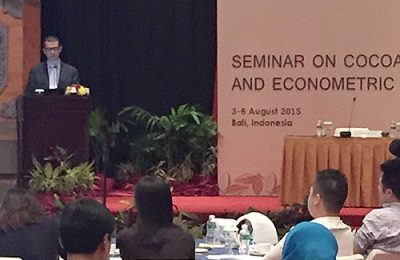Indonesia hosts cocoa futures market seminar
 Participants from all over the region and beyond attended the third in the series of ICCO seminars on the cocoa futures market and economic modelling of the cocoa futures market, held in Bali, Indonesia in August.
Participants from all over the region and beyond attended the third in the series of ICCO seminars on the cocoa futures market and economic modelling of the cocoa futures market, held in Bali, Indonesia in August.
The programme, designed for cocoa producing regions, has already had success reaching Latin American stakeholders (in Guayaquil, Ecuador in July 2013) as well as participants in West Africa (in Abidjan, Côte d’Ivoire in February 2014).
Generously supported by the Indonesian Ministry of Trade, the seminar was opened Mr. Dedi Junaedi, Director of International Marketing at the Ministry of Agriculture, and heard first from ICCO Executive Director Dr. Jean-Marc Anga, who stressed the importance of stakeholders gaining an understanding of the futures market and strengthening their capacity to adequately anticipate supply, demand and price trends in cocoa. Mr. Deny Kurnia, Director of Asia-Pacific Economic Cooperation and Other International Organization Cooperation at the Ministry of Trade officially opened the seminar.
The Bali seminar included two modules, with the first concentrating on the cocoa futures markets and the second reviewing econometric modelling of the world cocoa market. The futures market module was delivered by the ICCO’s Senior Econometrician Dr. Michele Nardella (pictured above) and by Mr. John Fry, Training Delivery Manager at ICE Education Ltd (part of ICE Futures Europe). It covered risks within the cocoa supply chain, futures contracts and exchanges, hedging strategies and case studies, and aimed to make sure that attendees understood the market risks within a cocoa supply chain, the counterparties’ contractual obligations in a physical contract, forward contract and futures contract, and also were able to assess the size, side and timing of a cocoa stakeholder’s exposure to risk.
Mr. Laurent Pipitone, Director of the ICCO’s Economics and Statistics Division, along with Dr. Nardella, delivered the second module, on econometric modelling of the world cocoa market. Cocoa market fundamentals, the qualitative and quantitative modelling approaches, the model’s parameters estimator, stylized facts about the world cocoa market, econometric specification, estimation and simulation, were covered by the module. At the end of the module, attendees were expected to be able to assess the current market, translate stylized facts into a quantitative expression, estimate the equation’s unknown parameters using software, build an economic model of the world cocoa market from those estimated quantitative relationships and to simulate the impact of changes in the macroeconomic environment of the world cocoa market.
In his concluding remarks, after the four-day seminar, Mr. Pipitone thanked the Government of Indonesia for its strong support of the seminar both before and during the event. Mr. Ery Novrizac Yunas, on behalf of his Director Mr. Kurnia, praised the ICCO Secretariat’s work in successfully implementing the capacity building programme in the Southeast Asian region.
Feedback from the 70 attendees was broadly positive and participants found the seminar helpful and pertinent.

